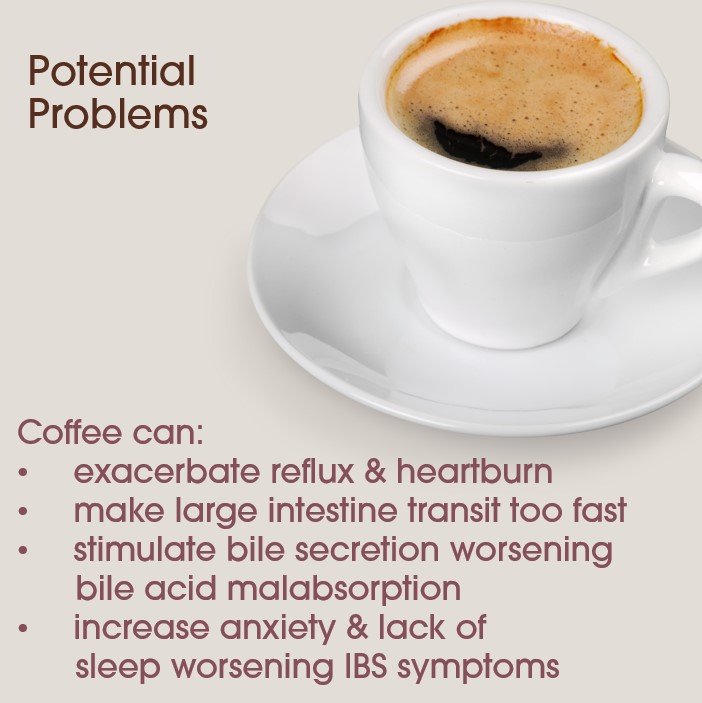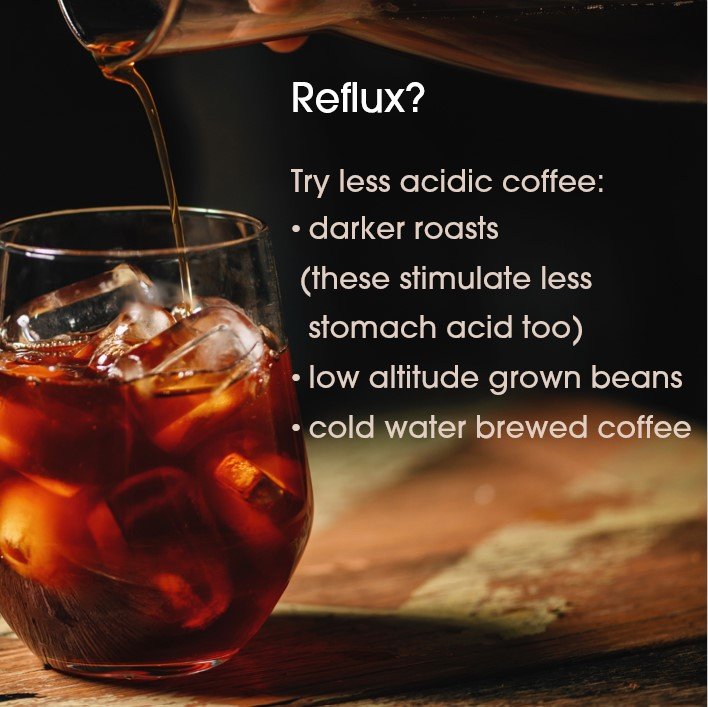Coffee and gut health
Today is National Espresso Day. I for one will be celebrating. I love coffee and can’t start work without it. Josephine on the other hand finds that coffee is not her friend. Why the mixed views – well coffee is a complex bean.
Coffee contains caffeine (of course), but also a whole host of other plant chemicals including antioxidants, fibre and oils. These vary with the bean type and how they are processed, roasted and stored.
But is coffee good for gut health? The answer is, it depends. The caffeine in coffee can exacerbate some conditions and improve others. And other components of coffee can be beneficial. Moderating your intake or tweaking your coffee choice can make a difference.
Potential Problems
Coffee can:
stimulate movement through the large intestine leading to diarrhoea
stimulate bile secretion (which is a problem if you already have bile acid malabsorption)
increase anxiety or reduce your ability to sleep, worsening IBS or IBD symptoms
exacerbate heartburn and reflux
What are your options?
If you suffer from reflux, try different beans and roasts – according to a 2010 study, darker roast coffees are usually less acidic, and so less likely to exacerbate heartburn and reflux. Darker roasts also contain more of a compound called N-methylpyridinium, a compound that blocks the ability of stomach cells to produce acid. If you find darker roast coffees taste too bitter, try cold water brewed coffee. It is less acidic and less bitter than hot brewed coffee.
Never made cold brew coffee? It’s not hard. Simply coarsely grind your beans. Combine the grounds with water, then let it steep overnight, or for around 12 hours. In the morning, strain it and you are ready to go. For a concentrated coffee you can dilute with milk and ice, use one cup of beans steeped in four cups of water.
Cold brew is perfect for making iced coffee, which is great now the weather is warming up (are you sweltering in 40 oC Perth? this one is for you!). It also works well in my favourite breakfast smoothie.
Low altitude grown beans from Brazil and Sumatra are naturally less acidic than higher altitude grown beans. Low altitude coffee typically has milder earthier flavour notes such as hazelnut and chocolate. You can avoid the (usually more expensive) coffee beans with fruity flavour notes. These flavours generally come from high altitude grown beans containing citric and malic acid.
If you have diarrhoea predominant IBS, try swapping to low caffeine beans like Arabica Laurina or de-caffeinated coffee and limiting intake to one cup a day. Look for Swiss Water Processed decaffeinated coffee because this process uses zero chemicals (just water) and leaves the beneficial polyphenols in the beans.
You could also try taking your coffee black or with oat milk or lactose-free milk. Around 4% of the Australian population are lactose intolerant and more find it is a problematic FODMAP, so there’s a chance it’s the milk contributing to your bloating and diarrhoea, not the coffee affecting your nervous system. However, multiple studies have found that coffee is a trigger for IBS symptoms. It is speculated that this may be due elevation of stress hormones or neurological effects that impact the gut brain axis.
If you have been diagnosed with bile acid malabsorption you may wish to skip coffee completely. Both caffeinated and decaffeinated coffee stimulate bile acid secretion.
Two recent studies found NO evidence that coffee consumption increases the risk of developing inflammatory bowel disease (IBD). Indeed, coffee is tolerated by most people with IBD. A recent study surveying 442 Crohn’s and colitis patients found that 73% consumed it regularly. However, 38% thought it made their symptoms worse (more of those with Crohn’s disease than those with ulcerative colitis) although not all affected avoided it.
Potential gut health benefits
There is growing evidence for a wide range of gut health benefits associated with coffee:
If you suffer from chronic constipation or the constipation predominant form of IBS, a cup of coffee in the morning may actually help get things moving. Upping water intake, movement and fibre will also help.
Coffee can also be great at ‘waking the gut up’ and getting things moving after abdominal surgery including after a C-section.
The coffee itself is a source of dietary fibre. A medium cup of coffee can contain as much as three grams of fibre, similar to that of a raw apple.
Moderate coffee intake may influence the composition of the gut microbiome, increasing the numbers of good bacteria. For example, a Swiss study in which a small number of volunteers consumed 3 cups of instant coffee (made from extracts of green and roasted beans) a day for 3 weeks found that the abundance and activity of Bifidobacterium spp. increased.
Similarly, laboratory studies have shown that the prebiotic fibre in coffee is rapidly metabolized into beneficial short-chain fatty acids by good bacteria.
Gallbladder stone disease is a common disease affecting 10-15% of the population. There is good evidence that coffee consumption reduces gallstone formation
Other health benefits
Overall, coffee seems to be beneficial to general health. Several compounds found in coffee possess antioxidant, anti-inflammatory, and insulin-sensitizing effects, which may contribute to anticancer activity. It’s worth noting though that research in this space in early stages and in some cases inconsistent.
There is growing evidence that coffee consumption (either caffeinated or decaffeinated) is associated with reduced risk of liver cancer and liver disease.
And back in the gut, a recent study looking at coffee intake and survival in advanced colorectal cancer found that increased coffee consumption was associated with better survival. The study was an observation study, not a randomised clinical trial, which means that confounding factors weren’t excluding and we can’t be certain of causality, but coffee drinking certainly didn’t make things worse!
Similarly, coffee appears to be good for heart health. A large biobank study in the UK found that consumption of decaffeinated, ground, and instant coffee (particularly at 2–3 cups per day), were associated with significant reductions in cardio vascular disease and mortality.
Key takeaway:
There appears to be multiple health benefits associated with coffee consumption, but everyone is different, so it is essential to monitor your intake of coffee and symptoms to determine what is best for you. It may be that like Josephine, you and your tummy are happier with a nice cup of tea!
Written by: Dr Mary Webberley, Chief Scientific Officer at Noisy Guts. Mary has a background in biology, with two degrees from the University of Cambridge and post-doctoral research experience. She spent several years undertaking research into the diagnosis of IBS and IBD. She was the winner of the 2018 CSIRO Breakout Female Scientist Award.
Reference
Want to know more about coffee and gut health, check out this review:






